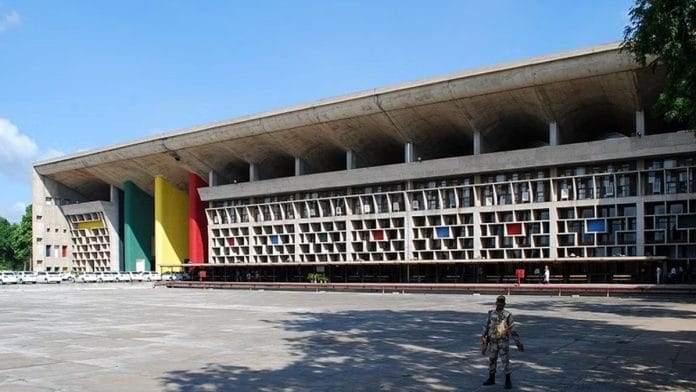Gurugram: “The state of Haryana continues to exercise absolute control over a private employer”, directing them to do something that would be forbidden in public employment, the Punjab and Haryana High Court said Friday.
A bench comprising justices Gurmeet Singh Sandhawalia and Harpreet Kaur Jeewan made the above observation while quashing the Haryana State Employment of Local Candidates Act, 2020, that mandated 75 percent of jobs in the private sector be reserved for local candidates. The bench said the state cannot discriminate against individuals on the basis of domicile. The Print has a copy of the judgment.
The law, which was passed in March 2021, came into effect in January 2022.
The high court was ruling on a clutch of petitions by industry bodies, the earliest being by the Faridabad Industries Association in December 2021, which pleaded that such a law is an infringement on the fundamental rights of a private employer as provided in Article 19 of the Constitution.
The petitioners also alleged infringement of Article 14 of the Constitution as all citizens have the right to equal employment, and to reside and settle in the state.
Opposing the petition, the state of Haryana had said in its reply that the members of the petitioner-associations were allotted industrial plots at subsidised rates for carrying out their business and trade and that there was a pre-condition in the allotment that 75 percent of the employment was to be given to local candidates where the posts are not of a technical nature.
It said while reservation on the basis of place of birth would violate the provisions of the Constitution, unemployed local youth were a distinct class and reasonable classification could be made of this particular class for the purpose of providing 75 percent employment in private sectors under the act.
In its short reply, the Union of India refrained from commenting by saying this was a state law with assent given by the governor.
The court order said, “…we are of the considered opinion that the restrictions imposed in the statute as such have far-reaching effect and cannot be held to be reasonable in any manner which would warrant no interference,” adding that the act “is held to be unconstitutional…and is ineffective from the date it came into force”.
Also read: Retired colonel wins 8-yr battle over false FIR, court sentences 76-yr-old neighbour in car park
HC bats for private employer
Giving an example of how private jobs cannot be given on the basis of domicile, the court said, “The private employer being a builder, for example, raising a multi-storeyed complex, cannot be asked not to employ a person who is skilled in the work of installation of woodwork or setting up of steel frames only because they come from states where people are proficient in such skills.”
The court said once a state forces a private employer to hire local candidates, “it would lead to large-scale similar state enactments providing similar protection for their residents and putting up artificial walls throughout the country, which the framers of the Constitution had never envisaged”.
Calling all restrictions on private employers under this law “gross’” the bench said this impairs a person’s right to carry on their occupation, trade, or business. The requirement to register any employee who was being paid less than Rs 30,000 per month on the designated portal within three months is violative of the fundamental rights protected under the Constitution of India, it said.
On the various conditions under the act, the court said, “The control of the state by a designated officer having a right to consider the cases of exemption to reject them is onerous. The requirement of submitting quarterly reports and the power of the authorised officer to call for records and to inspect premises for purposes of examining the records, registers, and documents by just giving one-day prior notice as such are conditions that can be termed as the ‘Inspector Raj’ of the state.”
Further, it said, the bar under Section 20 (of the act) of not being able to challenge the legal proceedings in any court against any authorised officer or designated officer further ties the hands of the employer.
(Edited by Smriti Sinha)
Also read: ‘Rs 10,000 per tooth mark’ — Punjab & Haryana HC fixes compensation for dog bites in public spaces






